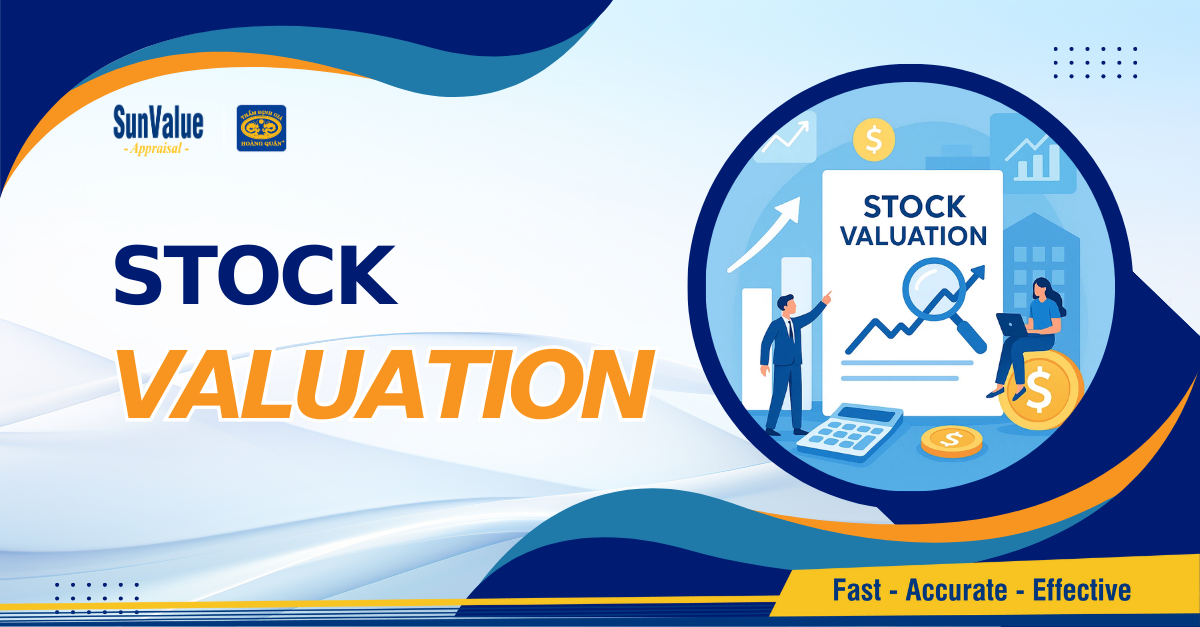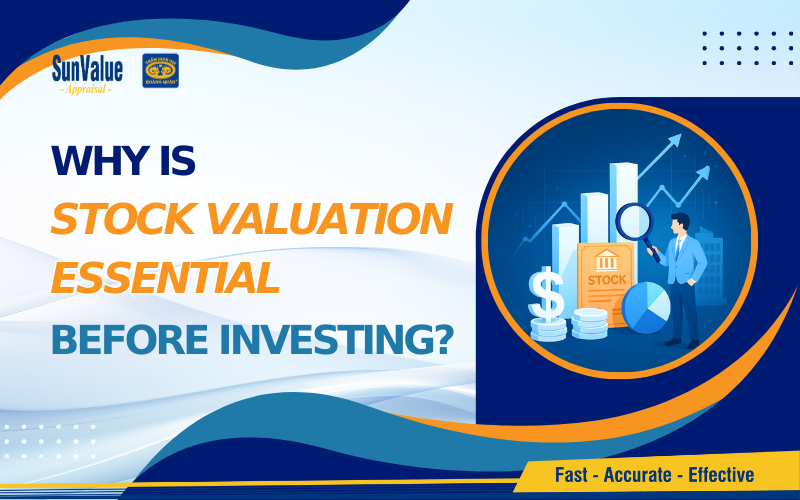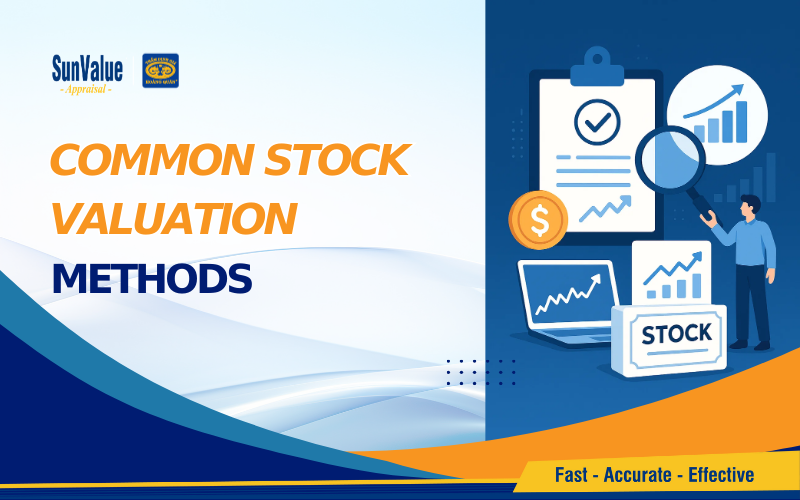Have you ever bought a stock based on rumors? Invested on impulse without knowing its true value?
If your answer is “yes,” you’re not alone. Thousands of individual investors - and even large corporations have faced this challenge simply - because they didn’t fully understand stock valuation.
So what is stock valuation, why is it considered the "compass" for every investment decision, and what are the most accurate, objective and reliable valuation methods today? Let’s explore in this article.

What is stock valuation and why is it essential?
Stock valuation is the process of determining the intrinsic value of a stock, helping investors identify whether the market is overvalued or undervalued.
While many still “bet” on rumors, trends, or ticker boards, long-term investors - like Warren Buffett - always start by understanding a company’s true value. That’s why stock valuation is a must before any buy-sell decision.
When is stock valuation necessary?
-
Companies preparing for an IPO need to determine a fair offering price.
-
Individual investors want to buy long-term stocks.
-
Investment funds and brokerage firms require analysis to make recommendations.
-
M&A transactions, private placements, business spin-offs and more.
Who needs stock valuation?
-
Long-term investors identifying potential businesses.
-
Pre-IPO companies issuing shares to the public.
-
Shareholders evaluating stock value for capital contribution or dividend sharing.
-
Companies involved in M&A, selling or restructuring ownership.
-
Investment funds, banks and financial institutions assessing investment risks and opportunities.
Why value stocks before investing?

-
Understand a company’s real worth: Market price can be inflated or undervalued compared to reality.
-
Spot investment opportunities: Undervalued stocks often offer strong growth potential.
-
Mitigate investment risk: Knowing a stock is overpriced helps you avoid buying at the peak.
-
Make informed buy/sell decisions: Valuation tells you when to buy, hold or sell.
Common stock valuation methods
1. P/E Ratio (Price to Earnings)
-
Formula: P/E = Stock Price / Earnings per Share (EPS).
-
Meaning: Lower P/E often signals better value. But always compare with industry average.
Example: If the banking sector average P/E is 10ư and the stock youre eyeing has a P/E of 7, it could be a good deal - provided no hidden risks exist.
2. DCF Method (Discounted Cash Flow)
-
Best for: Companies with stable cash flows.
-
How it works:
-
Estimate future cash flows (Free Cash Flow)
-
Discount them to present value using the expected rate of return
-
-
Pros: Accurately reflects intrinsic value
-
Cons: Relies heavily on assumptions and data quality
3. P/B Ratio (Price to Book)
-
Commonly used for: Banking and financial stocks
-
Formula: P/B = Stock Price / Book Value
-
Note: P/B < 1 might be a buying opportunity - but evaluate asset quality carefully.
4. PEG, P/S and relative valuation methods
Other valuation techniques include:
-
PEG (Price/Earnings to Growth): Prioritizes stocks with stable EPS growth
-
P/S (Price to Sales): Useful for startups or unprofitable businesses
-
Relative valuation: Compares with peers in the same industry

When valuing stocks on your own, you may easily make mistakes such as:
-
Trusting rumors, group chats or stock “tip” rooms
-
Overrelying on P/E or P/B without deeper business insight
-
Ignoring financial statements, debt levels, or real profitability
-
Overlooking macroeconomic factors: interest rates, FX rates, government policy, etc.
These errors can lead to risky investments, losses, and missed real profit opportunities. That’s why professional stock valuation services are essential. A trusted valuation partner not only reveals a company’s true value but also evaluates its risks, potential, and financial health - guiding you to smarter investment decisions and helping you avoid price traps.
Maximize your investment decisions with Hoang Quan’s stock valuation services
In today’s volatile financial market, stock valuation is more than a tool - it’s a strategic lever for M&A, share issuance, capital raising or financial restructuring. However, to achieve reliable results, you need a partner with not only expertise but also deep market insight.
With over 23 years of experience, Hoang Quan Appraisal is a pioneer in delivering standardized, efficient and highly secure stock valuation services. We don’t just give you numbers - we deliver a financial roadmap that empowers your smart investment strategies.
Why do businesses and investors choose Hoang Quan?
-
Multi-dimensional analysis with transparent data: We apply advanced valuation methods (DCF, P/E, P/B, etc.) combined with financial data, business models, industry positioning and ESG factors.
-
Expert consulting support: Our team of certified financial, audit and valuation professionals supports you at every step of the decision-making process.
-
Continuously updated market data: Ensures accurate reflection of trends and stock prospects.
-
Compliance - efficiency: Our valuation reports are legally recognized, suitable for IPO filings, investment negotiations, capital structuring, equity splitting, contributed asset valuation and financial disputes.
-
Optimized time and cost: Fast, secure processes with competitive fees-saving time and resources for businesses and investors alike.
⋙ Let Hoang Quan Appraisal help you uncover true value-clearly, comprehensively and strategically. Our stock valuation service is the foundation for every confident financial move.

Contact us today for a consultation:
Company: Hoang Quan Appraisal Co., Ltd.
Address: Hoang Quan Appraisal System
Phone: 0934.252.707
Email: contact@sunvalue.vn
Facebook: Hoang Quan Appraisal
Website: hqa.com.vn
Conclusion
In a rapidly changing financial landscape, stock valuation is no longer optional - it’s essential. By understanding its essence, applying the right methods and choosing a reputable partner like Hoang Quan Appraisal, investors and businesses alike can walk their financial journey with clarity, confidence and success.

